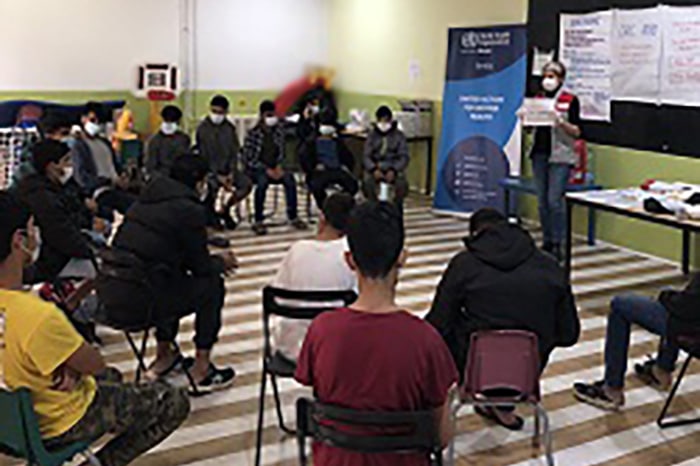Every year, more than 50 000 refugees and migrants pass through Serbia. On arrival, many are physically exhausted, traumatized, and need medical services and assistance.
However, migrants on the move often prioritize continuing their journey over caring for their health or getting treatment for serious medical conditions. Although health workers have been encouraging them to take protective measures to prevent the transmission of COVID-19, report any symptoms and get vaccinated as soon as possible, many migrants have low levels of trust in health services and little understanding of how to access them.
“I have been here for 4 years now and I am confused,” said a 23-year-old Afghan woman.
WHO/Europe has been supporting the Centre for Research and Social Development IDEAS, a Serbian civil society organization, to engage with migrant communities in Serbia as well as the health workers who treat them in reception, transit and asylum centres.
The initiative is among 8 community engagement projects taking place across Europe. It aims to improve the accessibility, quality and cultural sensitivity of health services for migrants to strengthen the resilience of the health system.
IDEAS works to ensure that the real-life experiences of migrants are considered in policy-making, and has helped to develop new structures, guidelines and professional roles that fill the gaps in responding to this vulnerable group.
The project’s strong engagement with the Ministry of Health and the Ministry of Labour, Employment, Veteran and Social Affairs has meant that special guidelines to benefit migrants have been quickly adopted.
Health mediators helping to improve accessibility of services
Thirty health mediator roles were created within the medical staff of reception, transit and asylum centres, with guidance produced to reduce the negative consequences of language barriers, sociocultural differences and tensions between ethnic groups.
In addition to conducting assessments of COVID-19 symptoms, mental health issues and other medical problems, health mediators specially trained in communication and cultural competency have been supporting migrants to access legal and social services. Their close relationships with migrants help them to feed back relevant information to health workers, IDEAS and the Ministry of Health to improve the quality and accessibility of health-care services.
“Now it is easier for me to talk about health problems that I have,” said a 28-year-old Afghan man.
“If a doctor asks me now to take off my clothes and I am not comfortable, I will say so and ask if there is a health mediator available,” said a 16-year-old Pakistani boy.
Health care adapted for refugees and migrants
Health workers employed in primary care settings received training in cultural competence approaches and practices, COVID-19 prevention and interventions, and referral mechanisms between health and social services.
They also learned how to support victims of trauma and violence, including survivors of gender-based violence, women and girls, unaccompanied and separated children, and addicts.
“I understood cultural competence training as a way of appreciating the context from which migrants are coming and how to better provide services for them,” said one of the health workers who participated in the training.
In addition, a workshop for 174 law students, who will one day provide legal services to refugees and migrants, was organized at the Faculty of Medicine in Belgrade to build greater appreciation for and understanding of these vulnerable groups.
IDEAS has also developed and disseminated information materials on the right to health and on health mediators to over 2000 migrants.
The CSO initiative in the WHO European Region
WHO/Europe’s Civil Society Organization (CSO) initiative is piloting new, bottom-up approaches in collaboration with governments to give communities a say in plans that affect their lives and to ensure they are involved in policy-making processes.
The CSO initiative is contributing to the COVID-19 response by strengthening community readiness for and resilience to emergencies, connecting vulnerable communities to services, and enhancing inclusive governance. Serbia is among 8 countries in the Region and 40 across the globe piloting such approaches.









